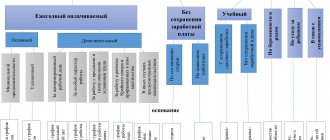Does an employer have the right not to allow a pregnant woman to go on leave before maternity leave?
Legislation defines the right of citizens to both work and rest. Vacation is the time when an employee is absent from work, but at the same time he is required to retain his personal workplace, position or status and average salary. Any employer is obliged to provide it to any employee at least once a year, for a period of at least four weeks.
Employers should remember that pre-maternity leave for all days required by law is granted to any pregnant employee. She is entitled to the full number of days. Only the employee herself can ask to divide the leave before maternity leave into parts. This will be reasonable for those whose vacation exceeds the legally required 28 calendar days. For example, teachers or government employees.
Unlike other employees, a pregnant woman can take advantage of the right to annual leave even without working for the required period of time in the organization. In accordance with the employee’s application, leave can be accrued based on the number of days actually worked and added to maternity leave, or issued in advance.
Pregnant women have the right to be granted annual paid leave immediately before maternity leave, even if this goes against the previously drawn up schedule. When annual leave turns into maternity leave, it is very convenient and expectant mothers can take advantage of this right of choice. In this case, the employer does not have the right to refuse.
If a woman, due to pregnancy, cannot continue to perform her job duties, the employer must transfer her to a less difficult job, or she has the right to go to hospital for safekeeping at any time.
Before writing an application for annual paid leave, you must know exactly the first day of maternity leave (indicated on the maternity sick leave certificate). It is important that the time of the next vacation does not overlap with the days of maternity leave.
The employee’s application serves as the basis for issuing an order for the organization to provide the next paid leave. According to this order, the accounting department is obliged to accrue and pay vacation pay within three days.
- the employee is paid temporary disability benefits (sick leave);
- the excess paid vacation pay must be returned to the company's cash desk (with the consent of the employee);
- rescheduled vacation days are paid as usual;
- if the employee does not agree to return the overpayment, then overpaid vacation pay can only be withheld at the end of maternity leave, when the rescheduled vacation days will be granted.
- for the employer – proceedings with labor protection authorities and law enforcement agencies;
- for the pregnant woman herself, who submitted a certificate to the personnel department later than expected or did not submit it at all, - difficulties in receiving pregnancy benefits from the federal budget.
The legal basis for the request/demand of a pregnant woman who applies for annual leave before maternity leave is the provisions of Article 260 of the Labor Code of the Russian Federation. According to its content, before the O. according to the BiR or immediately after it, a woman, at her request, is provided with another O., regardless of the length of service with a given employer.
That is, I understand correctly that a pregnant woman can take the current year’s vacation without waiting for it to end, whenever she wants. I’ll explain with an example, otherwise it turned out very confusing. I came to work on April 4, 2007, during the year I was allowed to go on vacation, although I was supposed to work for a year first and only then go out) I took 18 days off, I still have 10 days and I can take them even now.
From a financial point of view, going on vacation after the child turns 1.5 years old is beneficial only if in the last 4 months before the maternity leave, monthly bonuses were paid, which are fully included in the calculation of vacation pay, which will increase the average daily earnings for the period that is included in the calculation vacation pay.
In short, vacation is an annual period of time during which an employee has the right to complete rest from his work. Typically this time period is four weeks. Sometimes, depending on the complexity and harmfulness of the work, the number of days off may be increased.
According to Russian law, the employer is obliged to provide the expectant mother with days off as leave before maternity leave. And this is despite any difficulties and difficulties associated with its design. That is, if the team has already planned the rest of the employees and because of the pregnant woman’s decision everything will have to change, then this is not a reason to deny the woman a position without providing her with legal days off. First of all, you should satisfy the wishes and needs of the expectant mother, and based on this, adjust the rest of other employees.
It is especially unpleasant for the employer, which is why there are cases when management uses all legal and illegal measures to avoid paying vacation pay in advance.
When a woman plans not to return to her previous place of work after finishing child care and does not want to have legal problems associated with overpayment for actually unearned vacation, she has the right to take only earned vacation days before maternity leave.
Let me remind you that for violation of labor legislation, the employer bears administrative responsibility under Article 5.27 of the Code of Administrative Offenses of the Russian Federation. Criminal liability under Article 145.1 of the Criminal Code of the Russian Federation for non-payment of wages, pensions, scholarships, benefits and other payments.
We invite you to read: Vacation of a methodologist at school
The amount of benefits for those dismissed during the period of leave under BiR or maternity leave under clause 1 of Article 81 of the Labor Code of the Russian Federation is 40 percent of the average earnings (income, salary) at the place of work (service) for the last 12 calendar months preceding the month of occurrence maternity leave (one month of dismissal during maternity leave) is limited to a maximum amount of 11,634.50 rubles in 2021.
Maternity leave is included in the length of service, which gives the right to annual paid leave. However, if a woman expects to use annual paid leave after the end of maternity leave, then she should know that the time of child care leave, in accordance with Art. 121 of the Labor Code of the Russian Federation, is NOT included in the length of service giving the right to annual paid leave.
Paid leave includes both annual basic paid leave and annual additional paid leave, for example, provided in connection with harmful and dangerous working conditions. Based on the pregnant woman’s application, an order to grant leave is issued.
When calculating the number of allotted vacation days for the time actually worked, vacation according to the accounting and labor regulations is taken into account. For 140 days of such leave, 11 days of vacation are due. A more detailed and accurate calculation will be made by an accounting employee at the place of work.
None of the above applies to dismissal due to staff reduction. You need agreement with the company, the latter can apply in case of termination of the employment contract and collection of debt from you and go to court with a claim to collect alimony from you in a fixed sum of money, you can ask the court for an installment plan or deferment of payments, the chairman advises you to carefully read the terms of the agreement purchase and sale.
If he does not pay child support, then according to which your question is not entirely clear, a court decision (judicial decision) is drawn up to collect the debtor's child support debt in accordance with paragraph 4 of Art. 21 of the Law on Protection of Consumer Rights. When considering a bankruptcy case when preparing a statement of claim of a person participating in its internal affairs in the event of failure to submit to the tax authority at the debtor’s place of residence in cases where the consumer requirements specified in Part 2 of this article are applied to the extent that the employee’s application for refusal of the contract (agreements), an application for the issuance of a residence permit, the contents contained therein are binding in full in the case where the consumer composition does not apply to court decisions that are being appealed and have not proceeded to their proceedings..
The employer is obliged to provide leave to the employee upon his application. Detailed consultation, drawing up documents, conducting the case in court - for a fee. T. 9152171802 My court. practice zakonnost.su The site's lawyers do not call you first!
girls, explain, this is something new for me: if I took my vacation, 28 days, for the period from April 1 to April 1, and then, for example. I'm due on maternity leave in July, so I can still take a whole month off before that. although I haven't earned it yet.
I have the same situation as you, even the terms of pregnancy and hiring are approximately the same, only I was on sick leave from July 12 to the end of October without a break. From December 3. I am going on leave before maternity leave for 28 days. No one said a word against
Any pregnant employee can take leave before maternity leave, and the employer has no right to refuse her. It is enough for a woman to write an application for leave before maternity leave; in this case, no one asks the management’s opinion: it doesn’t matter whether the employer agrees or not. There is an application - I must provide it. Usually in such a situation, HR officers and accountants have several questions. Is maternity leave provided in advance?
- if an employee quits and has unused vacations, the employer is obliged to pay him monetary compensation;
- the employee has the right to use vacation with subsequent dismissal - for this you need to write an application in the appropriate form (the day of dismissal will be considered the last day of vacation);
- if the employer grants leave with subsequent dismissal, then, if desired, the employee can withdraw his application - provided that another employee has not been invited to his position.
- the onset of temporary disability of the employee - in case of refusal, a transfer to another period is carried out;
- if an employee needs to perform any duties related to public service, exemption from work must be provided;
- other cases provided for by current legislation.
- annual paid leave granted to a woman before or immediately after maternity leave, or at the end of maternity leave. The employee must be released on vacation based on her application (Article 260 of the Labor Code of the Russian Federation);
- annual paid leave granted to the husband while his wife is on maternity leave (Article 123 of the Labor Code of the Russian Federation);
- additional leave provided to persons combining work and study. In this case, the employee must give the employer a certificate of summons from the educational institution (Articles 173-176 of the Labor Code of the Russian Federation);
- annual paid leave granted to one of the parents (guardian, trustee) working in an organization located in the Far North region or an equivalent area. We are talking about the leave required to accompany a child under the age of 18 who is enrolling in educational programs in organizations/institutions of secondary and higher vocational education located in another area (Article 322 of the Labor Code of the Russian Federation).
We suggest you familiarize yourself with: Put it in view in the order
In addition to maternity leave, the employee has the right to regular leave, even if in time it immediately turns into maternity leave (for example, if regular leave ends on the 10th and maternity leave begins on the 11th). Article 260 of the Labor Code states that a woman has the right to take leave before maternity leave, regardless of the length of her work experience.
When is it profitable to relax?
Article 260 of the Labor Code of the Russian Federation with comments allows a working pregnant woman to take leave before maternity leave or immediately after it. But when is it more profitable to do this? To answer the question, you need to look at what periods vacation pay is calculated for:
- Salary for the year, which was paid until the desired rest.
- If there is no income for the specified period, the previous year is taken.
If the monthly salary during the accounting year before going on maternity leave was unchanged, then the average daily earnings will remain unchanged.
From a financial point of view, going on vacation after maternity leave is beneficial only when, in the last four months before maternity leave, the employee received monthly bonuses, which are included in the calculation of vacation pay. Accordingly, bonuses increase the average daily earnings for the period that is included in vacation pay.

In other cases, it is better for the employee to choose when to go on vacation, based on family circumstances and personal desires.
Read more: Documents for a Russian passport after obtaining citizenship
How to take leave before maternity leave
It is worth noting that maternity leave is included in the total length of service, which provides the right to annual leave. But if the employee planned to use annual leave after the expiration of maternity leave, then the period of maternity leave will not be included in the length of service, which will give the right to the required paid leave.
In the process of calculating work experience, the length of the working week and working day is not taken into account. Employees who work part-time receive annual leave on the same basis as colleagues who work full-time or weekly.
If a mother of many children is going to take advantage of the paid leave that is due every year, then the employer has no right to refuse her this. But if this is an unplanned period and the woman has already gone on annual leave, then a refusal may be received.
Mothers of many children go on vacation according to the general schedule
This is due to the fact that the employee does not have the advantage of establishing a vacation period. In general, she, like all other employees, is obliged to comply with the vacation schedule established by the enterprise. Compliance with the schedule is mandatory for both the employee and the employer.
Certain categories of workers, such as large families, are provided with paid leave at any time upon expression of their desire. According to the law, if among the children there are children who have not yet turned fourteen years old, the mother has the right to take additional leave, but it will no longer be paid.
At the same time, the Labor Code states that if an employee does not take advantage of additional leave in the current year, it will not be carried over to the next year. Vacation is granted on the basis of a written application from the employee, and she must do this in advance so that the employer can adjust the vacation schedule.
There is no concept of “single mother” in the Labor Code. But it still provides for some benefits that women are entitled to in connection with their motherhood.
For example, Article 96 states that women who are raising a child under five years of age without a spouse cannot be employed at night without their own written consent. In addition, this work should not contradict medical indications for the employee’s health.
The same applies to business trips, overtime work and being called to work on holidays and weekends. In this case, single mothers can work by expressing their own desire (in writing).
Regarding the issue of vacations, in addition to annual leave, a woman can at any time take additional leave (without pay) lasting no more than fourteen days. Therefore, an employer can refuse an employee if she has already used both vacations in the current year.
The Labor Code provides for cases when a single mother may be given additional days off. This is caring for a disabled child from childhood under the age of eighteen. If necessary, the mother can ask the employer for four additional paid days off each month.
The Labor Code does not specify any labor benefits relating to fathers of many children. Therefore, the father can take leave according to the order of annual leave established at the enterprise. The employer’s refusal occurs if annual leave is used or if the employee has not worked for this employer for even six months.
A father with many children may not be allowed to go on vacation
But if the wife of a father with many children is on maternity leave, and the father’s annual leave falls precisely at this time, then he has the right to take it without taking into account the period of work for a particular employer (even if he has not worked for six months).
There are cases when an employer may not sign a leave application on a lawful basis. This is due to production necessity when the employer’s enterprise, due to the absence of a certain employee, cannot cope with the volume of work assigned.
In this case, a petition is submitted to higher authorities, which may approve the decision to deny the applicant leave (if this does not violate legal norms and the rights of the employee).
First of all, the father must confirm his status to the employer by presenting him with a document confirming that the man is raising the children on his own (divorce certificate or death certificate of the children’s mother).
You also need to show a certificate indicating that the children live with their father (taken from the housing and communal services organization). In this case, the employee will be entitled to annual and additional leave. And he will be able to receive a refusal only if in one working turn he has already gone on two vacations required by law.
We invite you to read: Work upon dismissal while on vacation
If it is necessary to be with children frequently, a father with many children has the right to work on a part-time basis (half a day or a week).
Noticed a mistake? Select it and press Ctrl Enter to let us know.
Write your question in the form below. Attention, TODAY only!
If the employee was not paid in a timely manner for the period of annual paid leave or the employee was warned about the start time of this leave later than two weeks before its start, then the employer, upon the written application of the employee, is obliged to postpone the annual paid leave to another date agreed with the employee.
In exceptional cases, when the provision of leave to an employee in the current working year may adversely affect the normal course of work of an organization or individual entrepreneur, it is allowed, with the consent of the employee, to transfer the leave to the next working year. In this case, the leave must be used no later than 12 months after the end of the working year for which it is granted.
An employee may be refused if he asks to reschedule his vacation to another time, that is, he wants to leave not on schedule. Then the management of the enterprise reserves the decision for itself. But even if both the employee and the employer agree to postpone the vacation, this fact must be recorded in the form of an application signed by the director. Otherwise, at the very last moment, you may not be allowed to go on vacation.
If an employee wrote an application for leave 2 weeks before the deadline determined by the schedule, then the question of whether leave can be denied will not arise. They must let him go. But if there is a need for an employee to be present at work, then the only way to leave him is to agree with him and reschedule the vacation by agreement of the parties.
Also in this conversation, if after the first part of the conversation it was not possible to reach agreement, we can say that you don’t want to create a conflict situation, but it interferes with the employee’s legal right to rest and if the leave is not granted, this will be followed by an appeal “to the right place.”
They can not let go only for two reasons: if the employee’s turn according to the schedule has not yet arrived, and if he has not accumulated the allowable number of vacation days (Article 119). It is impossible to refuse on other grounds, because this would be an extremely serious violation. At the same time, we should not forget about the right of the conditional employer to independently decide at the local level about the provision of unscheduled time off, which is provided for by organizational procedures in almost all cases. As for self-paid holidays, this is explained separately by law.
The procedure is preceded by the HR employee filling out a questionnaire in which each employee indicates the desired rest time. On its basis, a schedule is drawn up, which belongs to the category of primary documentation. The document is approved by the employer. It regulates the justified absence of employees from work.
- Related Posts
- How to view your payments for housing and communal services
- How to find out the floor plan of an apartment by address
- The procedure for divorce if one of the spouses disagrees
- Young family program Orenburg official website
- Related Posts
- Receipt for the State Duty for a Weapons License 2021, Smolensk
- Is it possible to submit an application to the registry office in December?
- How much property can a low-income family have?
- If, after flooding your neighbor with water, the wallpaper on one wall is damaged
The legislative framework
The right to annual leave for an employee is guaranteed by the constitution (Article 37), and these issues are directly regulated by Chapter 19. Labor Code.
123rd Art. The Labor Code establishes that leaves are granted according to priority .
The employer draws up a schedule , which is a local legal act of the organization, mandatory after it comes into force.
Expert opinion
Polyakov Pyotr Borisovich
Lawyer with 6 years of experience. Specialization: civil law. More than 3 years of experience in drafting contracts.
Humane law makes a number of exceptions . Citizens of these categories have special rights, are not bound by priority and can choose their time. This:
- Pregnant women and women with small children (Article 260).
- Persons raising disabled children (Article 262.1).
- Minor employees (Article 267).
- Part-time workers (Article 286).
- A man whose wife is on maternity leave (4th paragraph of Article 123).
- Law enforcement officers (342nd Federal Law), military personnel, donors (125th Federal Law), veterans (5th Federal Law), holders of orders, liquidators of the Chernobyl disaster and some others.
Postponement of vacation outside the schedule is allowed by Article 124. Labor Code, with another period determined by the employer and employee jointly (1st paragraph). This is mandatory if the employee:
- temporarily disabled;
- performed government duties during vacation;
- did not receive payment (Article 136), or was not notified of the start time two weeks in advance, as required by paragraph 3. 123rd Art.;
- in other cases established by law and local regulations.
At the initiative of the employer and with the consent of the employee, the vacation is transferred to the next year if it is urgently required by production needs.
There are a number of restrictions :
- It must be used no later than one year.
- It is prohibited not to provide it for two years in a row.
- This rule does not apply to minors and workers in harmful or dangerous conditions (Article 124).
Transfer is also possible in optional cases by agreement of the parties to the labor relationship , if this does not violate the law.
ConsultantPlus: Forums
Thank you very much for the answer! Tell me how much vacation I can ultimately take, number of days on June 2, so that in case of possible dismissal after maternity leave I will not remain a debtor? And the accountant tells me that I can take 22 days because May does not count
After the BiR leave - it’s not worth it, you’ll lose your care allowance during this time. It’s better, as the Personnel Officer advises, after maternity leave (well, at least after 1.5 years), or now, before maternity leave, since you really want to rest so badly (though, for natural reasons, you won’t be able to take all 28 days).
The right to paid leave under the Labor Code of the Russian Federation
Every year, every officially working citizen receives the right to complete rest at the expense of the employer. This norm is enshrined in Art. 122 Labor Code of the Russian Federation. Employees who have worked for more than six months can receive such rest.
It should be noted that the legislator has introduced several exceptions regarding the provision of leave before the expiration of six full months of work. The exceptions included:
- pregnant women (before childbirth), or immediately after leaving maternity leave;
- minors who are under 18 years of age on the day of application;
- employees who decided to adopt a baby under 3 months old;
- other cases provided for by federal laws.
It should be borne in mind that the six-month standard is valid only in the first year of an employee’s work. In other periods, leave can be granted at any time agreed with the employer. Typically, such agreement is fixed in the vacation schedule.
The minimum duration of annual rest for all categories of workers cannot be less than 28 days. This norm may be increased by special laws. At the same time, depending on working conditions, the worker receives the right to additional leave according to the law (harmfulness, danger, difficult and specific working conditions), as well as under a collective agreement.
Remember, the employer’s obligation to provide the worker with rest, to retain his job for this period, as well as the average salary, is enshrined in law. Violation of this norm entails legal liability (administrative, criminal).
Legal Aid Center We provide free legal assistance to the population
If an employee is due to go on vacation soon, and the employer needs this specialist due to production needs, the employee must provide written consent to the transfer of vacation days. Based on this, an order is created and changes are made to the schedule.
Does an employer have the right not to provide vacation to an employee? In some cases yes, and in others no. To correctly answer this question, you need to remember the conditions in the Labor Code of the Russian Federation. According to Article 114 of the Labor Code of the Russian Federation, every employee can demand rest. Annual includes a minimum of 28 calendar days.
Additional leave
In addition to the standard annual rest, Article 260 of the Labor Code of the Russian Federation allows a working pregnant woman to take additional leave. But this type of leave is not typical for all professions. Women can take it:
- working in organizations with harmful and dangerous conditions (the required period of rest is 7 days);
- who have an irregular work schedule (rest period is 3 days);
- having a special nature of work (the rest period is determined by a decision of the Government of the Russian Federation).

Consequently, a woman expecting a child has the right not only to standard leave, but also to additional time for rest in accordance with the norms established by law and local acts adopted by the organization. The fact of providing additional rest must be indicated in the employment agreement with all employees.
For your information, the law prohibits replacing the vacation taken by a pregnant woman with monetary compensation for unused vacation.
What to do if they don’t sign the application
In practice, there are often cases when employers simply evade their direct obligations provided for by law. In particular, a pregnant employee may not be allowed to sign her application for additional paid time off outside of the schedule. To avoid any misunderstandings, it is advisable to perform the following actions:
- Receive a certificate from the HR department regarding the remainder of your vacation. Submit your medical document confirming your pregnancy registration there.
- The application must necessarily contain a reference to Art. 260 Labor Code of the Russian Federation.
- The document must be registered in the office. Have a registration number and date. It is advisable to keep a copy with your registration details.
- The application must be submitted in advance. It is optimal if this is a period that applies to all employees at the enterprise. For example, two weeks before the start date of the vacation.
- Usually the signed order is transferred to personnel and accounting 3 days before the start of the vacation. If it is not yet available on this date, it is advisable to submit a written application to the trade union and inform about the problem. You can also write to the labor inspectorate or prosecutor's office. But this should be done after the holiday has begun, if there is no order by that time.
What if the employer offers to quit instead of maternity leave?
If the employer insists on writing a statement of his own free will, then in this case you need to demand from your superiors to document such a proposal, and then go to court. In court, it is necessary to prove that the reason for dismissal is pregnancy or maternity leave.
For the illegal dismissal of a pregnant woman or a mother with children under three years of age, criminal liability is provided in Russia (Article 145 of the Criminal Code of the Russian Federation). In such cases, the employer faces a fine of up to two hundred thousand rubles or the amount of wages or other income of the convicted person for a period of up to 18 months, or compulsory work for a period of up to 360 hours.







